Lord Byron was writing. It was a good night for it, for the moon was full above the Grand Canal, and he occasionally looked up from his ornate desk in his long salon at the Palazzo Mocenigo to gaze for a moment at the shadowy fanciful shapes of the palazzi opposite, candelabra flickering from deep within their dark interiors. His own candles sputtered, but he sat in dishabille, in his loose silk Eastern dressing-robe, driving his quill pen across the page as another canto of Don Juan took shapely form.
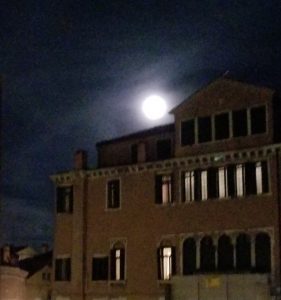
He ignored his servant, Vincenzo, a slender dark young man who entered the chamber and came toward him, holding his own candle, and stood there uncertainly. After a long moment, Byron looked up with irritation. “Well, what is it now? Did I not tell you I am at work, and cannot brook interruptions? Kindly withdraw.”
“Milord Byron,” said the servant diffidently, “I cannot help interrupting your lordship. “There is a lady here to see you, and she will not be sent away.”
Byron laid down his quill and turned to look at the young man with annoyance. “What are you talking of, Vincenzo? There is always a young lady, is there not? Multitudes of them. How many come each day, to pester me incessantly? Even at dead of night. You know your orders. Get rid of the creature at once.”
Vicenzo looked as if he might cry. “Oh your lordship, you do not understand,” he pleaded. “This lady is truly terrible.”
“What are you saying? Get rid of your young lady, by whatever means it takes. A terrible young lady? Do you suppose I care? Your task is to keep them out, I tell you!”
“No, no, Milord Byron, it is not a young lady!”
“Then what is it, by all that is holy? Some monstrous creature that haunts the lagoon by night? Come now, Vincenzo, have you gone mad? Why are you wasting my time?”
“It is an old milady. The – the one from next door!”
With that, the footsteps of a determined female were heard, striking and echoing on the marble floor. Byron and the servant turned to see her pass through the tall door and march down the salon.
It was Lady Catherine de Bourgh.
“Good God! Lady Catherine!” Lord Byron rose and frankly gaped at her. “What under heaven are you doing here at this time of night?”
“You must forgive my interruption, Lord Byron,” she said imperiously, “but the necessity could not be spared. I come on a most serious mission.”
He looked incredulous. “What can it be, madam, that cannot wait till morning? Does Darcy know that you are here?”
She waved this aside with her gloved hand. “Tsk, tsk, no. Darcy has nothing to do with this. Rather it concerns his wife.”
Byron’s tone changed, and his eyes softened. “Mrs. Darcy? You don’t say. In that case, Lady Catherine, pray be seated, and explain. I am afraid I cannot offer you any refreshment…” He looked at the tray left for his night consumption, with concern. It held only dry biscuits and soda water.
“You must know, Lady Catherine,” he explained with a charming smile, “I try not to gourmandize. I would rather not exist, than be large. My body suffers from the bad usage of its troublesome tenant, and therefore I try to abstain from food as much as possible. Hence, only the baicoli, these biscuits. Still – there is claret, prosecco, champagne. Vincenzo, bring some claret for the lady to drink.”
“I don’t take spirituous liquors,” said Lady Catherine stiffly.
“Oh, but you must. You are troubled; any one can see that. Some wine, and perhaps bring some cold meats, Vincenzo.”
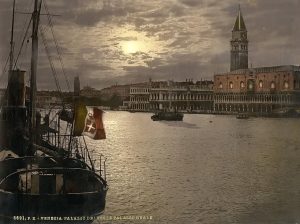
What Byron did not mention was that after a period of abstaining and near starving, on finishing an intense writing session, he would gorge on platters of meat and potatoes, with vinegar drizzled over them; and consequently there was always plenty of good things at hand waiting in the larders. Vincenzo, followed by two quickly awakened kitchen maids, brought plates heaped with salumi, the local appetizing cured meats, cheeses, and cold sardines and anchovies with onions. Lady Catherine paid no attention to the food, but did drink the claret.
“There, that is better, I am sure,” Lord Byron told her. “You strike me as a lady who needs more wine than she is in the habit of consuming. You know what I have written, I hope? ‘Let us have wine and women, mirth and laughter / Sermons and soda water the day after.”
Lady Catherine regarded him sternly. “Wine and women! What can you mean by reciting such a sentiment to a lady?”
“I don’t follow the prescription very well myself,” he said ruefully. “I have however observed that an Englishman raised on beef and beer becomes a violent, corpulent fellow, and that is my especial horror. Most nights, only milk of magnesia for me.”
“You are given to very unwise practices, Lord Byron, and need to thoroughly reform,” said Lady Catherine, drawing her heavy black brows together in stately disapproval. “You will ruin your health. Still, you do not seem as bad as your reputation. I do not know what to make of you.”
“Yes, nobody ever does know what to make of me; people invariably guess wrong. The truth is that I have no character, at bottom. I am so changeable, such a strange mélange of good and evil, that it would be difficult to describe me.”
“I am not here to try to fulful such a vain purpose,” said his visitor rather coldly, but Lord Byron was warming to his favorite subject, himself.
“I am of a wayward, uncertain disposition, you see, more disposed to display defects than not; and people are always ready to believe the evil.”
“Lord Byron,” said Lady Catherine. “I did not come here to discuss your character or habits.”
“What then? I confess I cannot account for your visit, charming though it is. Why do you not tell me your purpose?”
“No – I cannot do that,” she said, with a sidelong glance around the salon. “What I have to say must be entirely private. There can be no possibility of any eavesdroppers.”
“I say, you do raise my curiosity. You were talking of Mrs. Darcy – can it be? Did she send you here? That would be quite extraordinary. If she wants to meet me, I must say she has selected an unusual emissary to send on such a mission. A note would have done…but no, no, that might have ended up in her husband’s hands, I suppose…”
He looked at Lady Catherine inquiringly. “Nothing of the sort,” she exclaimed. “Good heaven, I have never witnessed such abominable conceit in my life! Do you actually imagine, Lord Byron, that the wife of Mr. Darcy is in love with you? That she is faithless to him? I grant, she is not of any high ranking or noble family, only a common woman, and I never approved of the match; but your suggestion is outrageous.”
He looked at her in surprise. “I do not suspect Mrs. Darcy of being in love with me,” he said mildly. “Indeed not. She seems remarkably content with her own husband. I was only trying to account for possibilities raised by your visit.”
“In truth, you might be justified in suspecting vile preferences and practices on her part. You must remember that blood tells, and hers is low, very low. Only think what her sister is.”
Byron could not controvert that. “Yes. Lydia is a baggage and a half.”
“But I can say no further on this subject here. We must go somewhere absolutely private. Lord Byron, will you take me out in your gondola?”
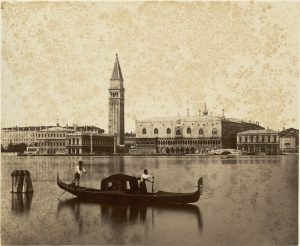
“My gondola?” Lord Byron, who was accustomed to taking young women out at night in his gondola for trysts of an entirely salacious variety, stared at Lady Catherine, as if trying to assess her.
“Yes; did you not hear me? Take me at once, for I cannot speak here,” she ordered him.
“Well, well – of all strange adventures, this is the strangest,” he murmured, and sent orders for Tita, his personal gondolier, to be summoned.
While they waited, Byron cheerfully rattled on about his gondola. “It is a very fine one, Madam. You will enjoy seeing it. All nicely fitted with a felze – do you know the word?”
“I cannot say that I do.”
“A little covered compartment with cushions. When the passengers are inside, no one outside can see what they are about. They are perfectly concealed by a curtain called the baticopo. Very comfortable and convenient, I assure you. In this way a gondola can be used as what you like: a lovers’ nest, or perhaps a place for escaped criminals. Did you know that?”
“I knew that Venice,” said Lady Catherine sententiously, “was reputed to be the most wicked place in the world, and I see it is so.”
“That is one reason I love it, Lady Catherine, that and its beauty. Life is freer here for the libertine than any where else in Europe; certainly England cannot compare. Now, will you have another glass of wine while Tita readies the gondola? And I will recite something I have written on the subject:
Tis a long cover’d boat that’s common here,
Carved at the prow, built lightly, but compactly;
Row’d by two rowers, each call’d ‘Gondolier,’
It glides along the water looking blackly,
Just like a coffin clapt in a canoe,
Where none can make out what you say or do.”

Lady Catherine sat looking at him silently out of her glaring black eyes, but her third glass of wine had softened that gaze perceptibly.
In another quarter of an hour, any body passing by the landing at the base of the Palazzo Mocenigo, would have observed a masked Lord Byron helping a veiled lady, a bit stout and stiff in her movements, descend into his shiningly black nobleman’s gondola. She was soon settled inside the felze, with cushions all around, and Byron seated himself beside her and gave his directions to the gondolier. The vessel silently moved out onto the dark waters of the canal, glittering with the path of moonlight down the center, and slowly glided toward the lagoon.
When the gondola was away from all other craft, Lord Byron spoke. “Surely, now we have the privacy you desire, Lady Catherine. Now, tell me what is the purpose of this extraordinary meeting? I collect that it has to do with that Lydia baggage. But you need not have taken so much trouble to approach me upon that subject, for we must be of one mind. I can wish her gone from here and back in England no less than you can do.”
“No – it is not Mrs. Wickham. I can order her off at any time and it is done. I shall do it tomorrow, if such is your desire.”
“That would be very convenient, and I applaud you heartily for the notion. Is that all you wished to tell me? We may then perhaps return to Palazzo Mocenigo, and,” he said with a sigh, “I can finish my night’s work.”
“No, that is not quite all. What I have to say is this,” Lady Catherine said hoarsely, and moved closer to his lordship in the cushioned seat. “You must know that despite your indecent manner of living, which I contemn, I do now believe that I have traduced you, to some extent, unfairly. I was prejudiced by your salacious reputation, but now I have formed a slightly better opinion of your character – even though you say you have none. I regret that I went so far as to call you a Devil.”
Lord Byron laughed, and moved a little away from her. “If this is an apology, I accept it wholeheartedly,” he said. “You are not the first person to call me a devil, and will not be the last.”
“When I laid eyes upon your countenance,” she told him, her stern face dissolving into tremulous softness, “I knew at once that you could not be really evil.”
“Oh indeed? I am afraid your earlier impression was on the whole more correct, then, madam. I may not be exactly the incarnation of evil, but I am quite a bad lot, I do assure you.”
“No!” she cried. “You are a blend of all the passions, you have true genius, and such a shining, beautiful countenance! O Byron, what I wish is only for you to do what I know you have done before, here in this very gondola, with who knows how many other women!”
“You don’t mean me to serve you, madam?” he asked, startled, despite being a man of the world who had seen and done so much.
“Only one kiss,” she insisted, her chin trembling, “and never again.”
“One kiss, is that all? Modest enough, I declare. And then we can return to Mocenigo, and that will be that? And you will take Lydia back to England with you?”
“Yes, yes, to everything.”
“Very well, then, so it shall be.” And he reached for her.
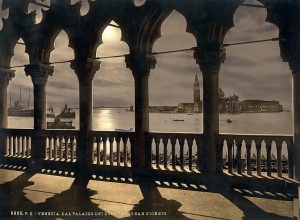
The moon had gone behind a silver cloud, and a young woman came through the darkened gardens between the linked palazzi, to enter the quarters of Lord Byron. She knew the way, and had reached his chamber door when the servant spotted her.
“Oh, no, lady, do not go in there!”
“But why ever not? I always do, when I pay a nighttime visit to his Lordship. He is used to me, as you very well know, Vincenzo.”
“Yes, but he is not there!”
“Not there?” Lydia flung open the door and looked within. The candelabra was down to its last flickers on his table, the cold meats still remained, but true enough, there was no Lord Byron. “Then, where is he?”
The servant looked expressively toward the door that led to the canal landing. Lydia scurried out and gaped to see no gondola there. She turned toward the man. “What – do you mean he is out in the gondola? With a lady?”
“Yes. They have been gone this last hour. I believe they will be returning at any moment.”
“Then I shall wait.” Lydia tightened the cloak, a black furred one of Lizzy’s that she wore over her scanty night dress.
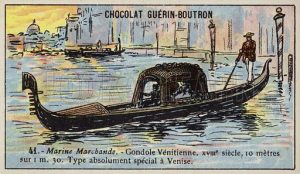
Sure enough in only a few moments the watery sounds of an oar paddling through water was heard, and as the moon peeked through the clouds, the gondola sliding toward the palazzo became visible, with two figures dimly seen seated close together in the felze. Lydia waited silently as the gondolier tied up the craft, and Lord Byron jumped out and helped the tall, veiled lady to ascend to the stone landing.
As the two of them came closer to Lydia waiting in the shadows, she leaped at the woman and tore off her veil in one movement. The shock stopped her in her tracks.
“Lady Catherine!”
“Lydia! What is the meaning of this!”
“You ask me that! What is the meaning of you and Lord Byron in a gondola, I can ask you! Don’t you know what he does with women in a gondola? How can you?”
“And how dare you question me!” said Lady Catherine angrily. “We were having a private conversation. And the result of it is that Lord Byron has agreed that I shall order you home to England at once. I intend to see that his wishes are fulfilled, and that decision is final.”
“Byron – did you really – “
“I answer no questions, Mrs. Wickham,” Byron responded with a smile. “It would not be gentlemanly. to reveal confidences.”
Lady Catherine rewarded him with her best simper, which Lydia saw with mingled bewilderment and chagrin. All she really understood was that there was nothing for her in Byron’s chambers this night.
“Now, ladies, you had better slip back to the Darcys’ section of the palazzo as quietly as may be. I am certain neither of you want Mr. and Mrs. Darcy to know where you have been, do you? And as for myself, I had much better go back to my writing.”
“Yes, you must,” agreed Lady Catherine, turning away to follow Lydia. “But oh, Byron, speaking of writing, I shall write to you.”
“You will?” he asked blankly. “But surely there is no need – the matter is settled – “
“Indeed I shall. For I have heard that you are given to making a confidante of a clever woman who is a little bit older than you, and wiser. Have you not been particular friends with Lady Melbourne, and Lady Blessington, and Lady Oxford? I flatter myself that I can offer you as sensible advice as they, and keep your secrets too. It will be a fine thing for us both.” Lady Catherine nodded emphatically, her face wreathed with smiles, as she moved away, leaving Lord Byron, for once, lost for words.
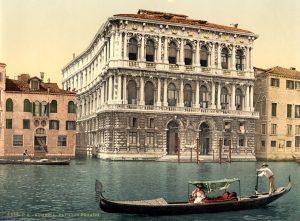

14 comments
Skip to comment form
Thoroughly delicious and enticing!
Author
Thank you so much, Beth Janelle! Glad you enjoyed it!
Oh good Lord!!!! (I think that says it all at the moment 😉)
I certainly don’t want to dwell on this chapter but will just say again – shame on Lydia for ‘borrowing ‘ Elizabeth’s lovely clothes,
Author
It does seem to emblemize Lydia’s shameful behavior, doesn’t it, Glynis? 🙂 Thanks for commenting.
Lydia has no shame and if I was Lizzy, I’d never wear anything Lydia wore when she was visiting Byron. I simply could not do it. La! Lady Catherine… well… I think I just threw up in my mouth. Oh well. Older ladies need adventure too… I suppose. What an excerpt.
Oh to be a fly on the wall inside that gondola!
Author
Meg, that was the phrase I kept thinking myself while writing it…fly on the wall, LOL!
Okaaaay…. that I did not expect at all! Lady Catherine and Byron…
unexpected, if fairly interesting. Lydia is still, well Lydia, and I agreed wholeheartedly with Byron’s opinion of her!
Heaven help Lord Byron! At first I thought she was going to ask Byron to seduce Mrs. Darcy, but now I think she just wanted to have the prestige of Lady Melbourne, Lady Blessington and Lady Oxford to say she was ‘with’ Lord Byron and writes to him too! Oh yes, heaven help him now!
Author
Carole, thanks for commenting – I did want to suggest a bunch of hints, and then you’d be surprised by what happened! And there will be mooooooore….
oh my goodness, Lady Catherine and Lord Byron an item of gossip!!!! I can’t believe it. And Lydia knows about it.
Author
Hee hee hee, Hollis! I believe you have just given me the idea for the next episode! A spot of blackmail, perchance? We shall see!
LOL!!! Who would have thunk??
Thanks for this hilarious scene, Diana!!
Warmly,
Susanne 🙂
Good to hear from you Susanne and I’m so glad you enjoyed it!